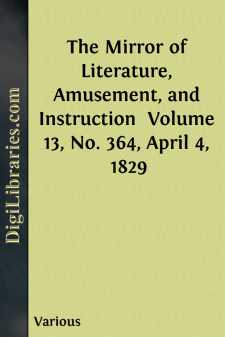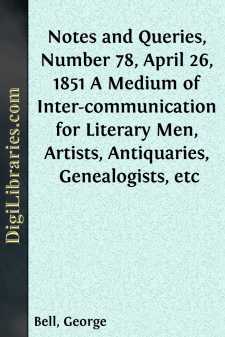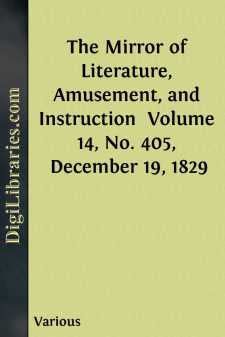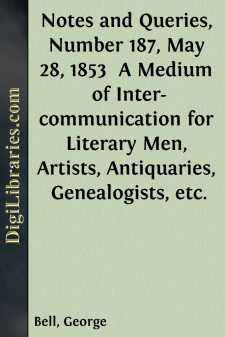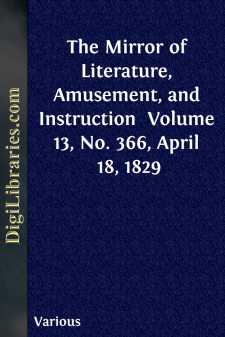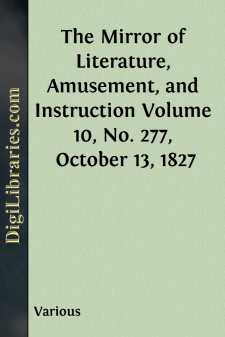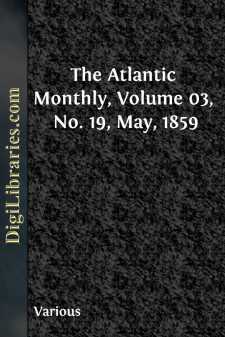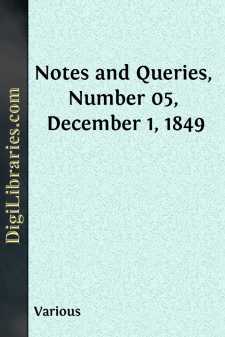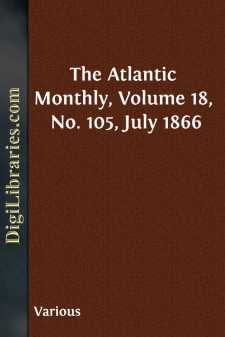Periodicals
- Art 27
- Children's periodicals 59
- Entertainment 5
- Food/Wine 2
- Games/Humor 455
- General
- Health 1
- History 53
- House/Home 1
- Regional 62
- Science/Nature 118
- Transportation 10
General Books
Sort by:
by:
Various
TOMB OF GOWER, THE POET.Tomb of Gower, the Poet.Dr. Johnson has dignified Gower with the character of "THE FATHER OF ENGLISH POETRY"; so that no apology is required for the introduction of the above memorial in our pages. It stands in the north aisle of the church of St. Mary Ovrie, or St. Saviour, Southwark; and is one of the richest monuments within those hallowed walls. The tomb consists of...
more...
by:
George Bell
ON THE PROPOSED SUGGESTIONS FOR PRESERVING A RECORD OF EXISTING MONUMENTS. The following communications have reached us since the publication of our remarks on the proposed Monumentarium Anglicanum (No. 73. p. 217. et seq.). They serve to show how much interest the subject has excited among those best qualified to judge of the great utility of some well-organised plan for the preservation of a record...
more...
by:
Various
NEW BUILDINGS, INNER TEMPLE. "The Temple," as our readers may be aware, is an immense range of buildings, stretching from Fleet-street to the River Thames, north and south; and from Lombard-street, Whitefriars, to Essex-street, in the Strand, east and west. It takes its name from having been the principal establishment, in England, of the Knights Templars; and here, in the thirteenth century...
more...
by:
George Bell
ON CHAUCER'S KNOWLEDGE OF ITALIAN. In the Memoir prefixed to the Aldine edition of the Poetical Works of Chaucer, London, 1845, Sir Harris Nicolas expresses an opinion that Dan Geoffrey was not acquainted with the Italian language, and therefore not versed in Italian literature. "Though Chaucer undoubtedly knew Latin and French, it is by no means certain, notwithstanding his supposed...
more...
by:
Various
HARROW SCHOOL.HARROW SCHOOL.To lofty HARROW now.—THOMSON. Harrow-on-the-hill was a place of some consideration, even before the foundation of the scholastic establishment which now forms its principal boast. The Archbishops of Canterbury had an occasional residence here, in the centuries briefly succeeding the Norman Conquest; and they obtained for the inhabitants a weekly market, long since fallen...
more...
by:
Various
THE PALACE AT STOCKHOLM. The palace at Stockholm is the redeeming grace of that city.—Stockholm "not being able to boast any considerable place or square, nor indeed any street wider than an English lane; the exterior of the houses is dirty, the architecture shabby, and all strikes as very low and confined. Yet the palace must be excepted; and that is commanding, and in a grand and simple...
more...
by:
Various
THE GYMNASIUM. Two distinct yet harmonious branches of study claimed the early attention of the youth of ancient Greece. Education was comprised in the two words, Music and Gymnastics. Plato includes it all under these divisions:—"That having reference to the body is gymnastics, but to the cultivation of the mind, music." Grammar was sometimes distinguished from the other branches classed...
more...
by:
Various
LORD CHATHAM--QUEEN CHARLOTTE.Original Letter, written on the Resignation of Mr. Pitt, in 1761--Public Feeling on the Subject, and Changes at Court in consequence--First Impressions of Queen Charlotte.[The following valuable original letter is now published for the first time. It will be found to be of very considerable historical curiosity and interest. The resignation of the Great Commoner in 1761,...
more...
by:
Various
A. A.(A.) on solemnization of matrimony, 46.Admiration, a note of, 86.Adur, origin of, 71. 108.Æneas, Silvius, 423.Aërostation, works on, 199. 251. 269. 285. 317. 380. 459.Aerostation, squib on Lunardi, 469."A Frog he would," &c., 45. 188.A.(F.R.) on Dr. Maginn, 109.—— on the Darby Ram, 285.—— on "Epistolm Obscururum Virorum," 122.—— on Parse, 522.—— on Hockey,...
more...
by:
Various
THE CASE OF GEORGE DEDLOW. The following notes of my own case have been declined on various pretexts by every medical journal to which I have offered them. There was, perhaps, some reason in this, because many of the medical facts which they record are not altogether new, and because the psychical deductions to which they have led me are not in themselves of medical interest. I ought to add, that a...
more...


